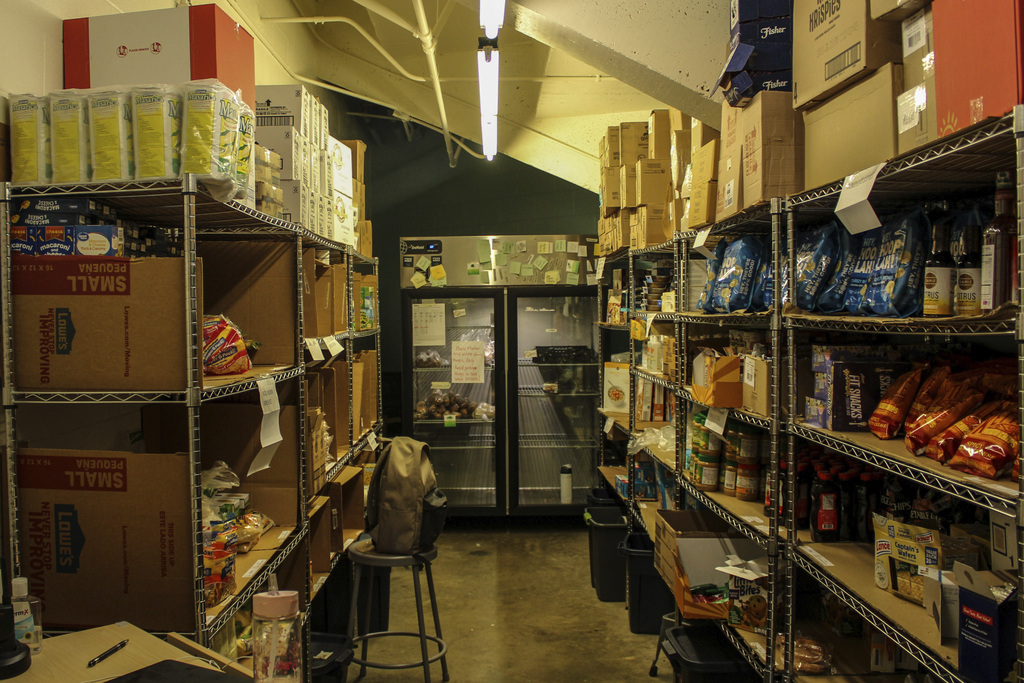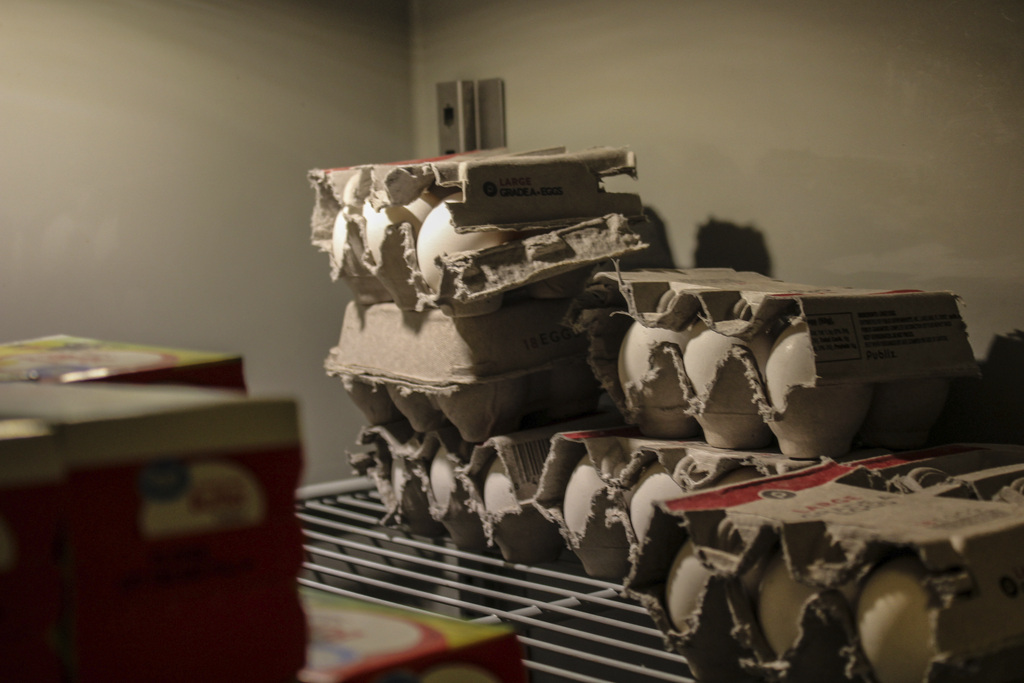
Ram Pantry’s check-in and pick-up location features refrigerated goods, non-perishable items and a desk with a sign-in sheet upon entry. (Photo by Aidan Lubin)
By Jackie Llanos and Aidan Lubin
The first floor of VCU’s Commons is home to Subway, Pizza Hut and the ever-popular Chick-Fil-A, but a left turn past the pool table takes Ave Clyburn to the two storage closets where she gives free food to students and faculty twice a week.
The Northern Virginia native has been taking on this responsibility for the past two semesters as part of a work-study program. Among all her work options, she chose the Ram Pantry because she wanted to help her new community.
“I like that I’m helping people help people,” she said.
VCU opened the Ram Pantry in 2015 to ensure its full-time students, and now faculty, have a place to turn to when access to food is scarce. The pantry’s mission is important in aiding the 35 percent of students at VCU who are food insecure, according to a recent study from the university’s School of Social Work.
This semester, Clyburn works three-hour shifts on Tuesdays and Thursdays, which was a change from the busier Monday and Wednesday hours she worked when she first started. A quiet, “Hi, is this your first time here?” is her usual greeting to determine how she can best help folks who are picking up or basketball players and fraternity members dropping off donated food.
Requests from people who come to the pantry vary from a student quickly dropping by for a bag of cornflour to up to the 30-item-per-week limit.
FeedMore-a nonprofit that distributes food across 34 counties and cities in Central Virginia-the school’s fraternities and fundraisers from the basketball team are responsible for most of the canned goods inside the pantry, although “students are most drawn to fresh produce, chips and sweets,” Clyburn said. The staff buys gets those items from Publix and Kroger.
On other days, she spreads the word about the pantry at different campus locations like the library.
“I think a lot more people could know about it,” she said. “It’s just hard because of our current location, and we can’t put up as many signs to where the pantry is.”
The coming move to a bigger space over the summer or during the fall semester could help lessen the stigma some students might feel from others knowing they struggle with food insecurity, Clyburn said. She hopes that the free thrift store they will share the space with will draw in more students. They also need a bigger space because donations are flowing in: Pasta boxes, bars of soap, fresh produce and other goods are stacked ceiling-high in the two closets, leaving a narrow space for the staff to navigate.

Ram Pantry’s refrigerated goods: egg cartons and sticks of butter. (Photo by Aidan Lubin)
Ram Panty faculty adviser John Jones is helping coordinate that move. The environmental studies professor knows what is like to not know where the next meal is coming from because he grew up in poverty and continued to struggle with food insecurity throughout his time at the University of Dayton in the early 2000s. Transitioning from the end of the semester to summer was also a time when he had to get creative about sourcing food.
“I spent my last dollar buying day-old bread from Jimmy John’s, and then I ate that bread for a day and a half,” he recalled, adding that public universities such as VCU have a responsibility to support students who grew up in poverty because often they are the only institutions those students can attend.
“We are a public institution, we take a lot of students from low-income backgrounds,” he said. “Just because you turn 19 and then magically go to college, it doesn’t stop the problems that your family was facing when you were 18 or 17.”
With 28,408 students and a capacity to only house about 20 percent of them, VCU students are also battling against skyrocketing rent prices in Richmond, which rose by 12 percent last year, according to Axios.
“Richmond is very expensive,” Clyburn said. “Everything’s more expensive because of inflation.”
But her advocacy for the program doesn’t stop when she clocks out. She encourages her friends to visit the pantry, particularly toward the end of the semester as people start to run out of meal swipes-VCU’s on-campus dining plan gives students 200 or 250 meal swipes per semester, according to its website-and food insecurity becomes more pronounced.
“People are running out,” Clyburn said. “My roommate has seven swipes left, but we still have a month left.”
Working at the pantry has enabled Clyburn to help unhoused people in the area. She said she sometimes offers someone in need a warm meal using her swipes, knowing that if she runs out she has access to the pantry.
Rebekah, Ave’s sophomore shift partner, said that some students consider seeking help as “taboo.” She can tell when people are hesitant coming into the pantry, but the staff’s goal is to create a safe space.
“We assure them that they’re just getting groceries,” Rebekah said.
